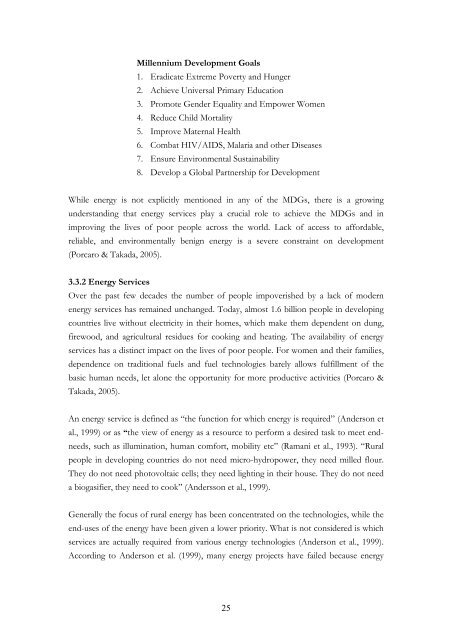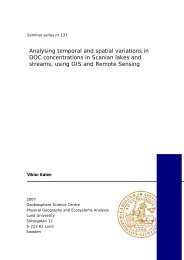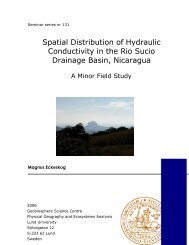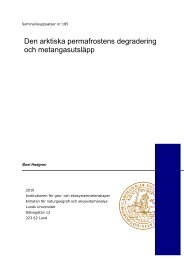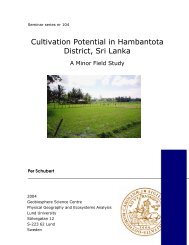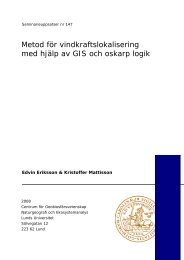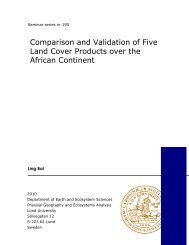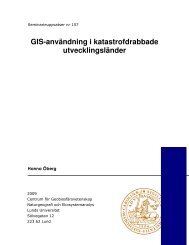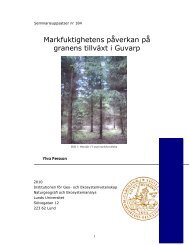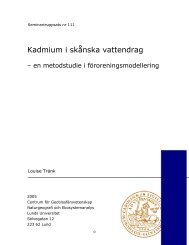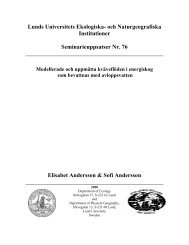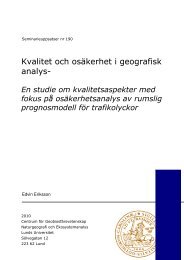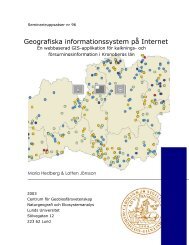Table 3.5 <strong>Small</strong>-scale hydropower capacity and generation potential by world regions to 2020. Source:WEC, 1994.Current policies case capacity (MW)Favourable case capacity (MW)Region 1990 2005 2020 1990 2005 2020North America 4,302 5,154 6,152 4,302 8,604 12,906Lat<strong>in</strong> America 1,113 2,607 5,751 1,113 2,937 6,557Western Europe 7,231 9,704 12,587 7,231 14,462 21,692E Europe and CIS 2,296 3,082 3,997 2,296 4,592 6,889Mid East and N Africa 45 108 233 45 119 266Sub-Saharan Africa 181 434 935 181 477 1,065Pacific 102 137 177 102 204 306Ch<strong>in</strong>a 3,890 9,331 20,101 3,890 10,264 22,915Asia 343 823 1,772 343 905 2,021Total 19,503 31,380 51,705 19,503 42,564 74,617Current policies case generation (GWh)Favourable case generation (GWh)Region 1990 2005 2020 1990 2005 2020North America 19,738 23,645 28,225 19,738 39,476 59,214Lat<strong>in</strong> America 4,607 11,050 23,805 4,607 12,155 27,138Western Europe 30,239 40,580 52,636 30,239 60,477 90,715E Europe and CIS 9,438 12,665 16,428 9,438 18,875 28,313Mid East and N Africa 118 285 613 118 313 699Sub-Saharan Africa 476 1,139 2,454 476 1,253 2,797Pacific 407 562 730 407 838 1,257Ch<strong>in</strong>a 15,334 36,780 79,235 15,334 40,458 90,328Asia 1,353 3,243 6,987 1,353 3,567 7,965Total 81,710 129,949 211,113 81,710 177,412 308,4263.3 Rural DevelopmentThis section discusses what role energy and electricity has <strong>in</strong> the context of developmentand what measures regard<strong>in</strong>g rural electrification are made <strong>in</strong> <strong>Uganda</strong>.3.3.1 Millennium Development GoalsAdopted unanimously by the <strong>in</strong>ternational community <strong>in</strong> 2000, the MillenniumDevelopment Goals (MDGs) are a list of development objectives to be achieved by2015. The MDGs have been established to eradicate world poverty and addresschallenges <strong>in</strong> hunger, health, gender equality, education, and environ-mentalsusta<strong>in</strong>ability.24
Millennium Development Goals1. Eradicate Extreme Poverty and Hunger2. Achieve Universal Primary Education3. Promote Gender Equality and Empower Women4. Reduce Child Mortality5. Improve Maternal Health6. Combat HIV/AIDS, Malaria and other Diseases7. Ensure Environmental Susta<strong>in</strong>ability8. Develop a Global Partnership <strong>for</strong> DevelopmentWhile energy is not explicitly mentioned <strong>in</strong> any of the MDGs, there is a grow<strong>in</strong>gunderstand<strong>in</strong>g that energy services play a crucial role to achieve the MDGs and <strong>in</strong>improv<strong>in</strong>g the lives of poor people across the world. Lack of access to af<strong>for</strong>dable,reliable, and environmentally benign energy is a severe constra<strong>in</strong>t on development(Porcaro & Takada, 2005).3.3.2 Energy ServicesOver the past few decades the number of people impoverished by a lack of modernenergy services has rema<strong>in</strong>ed unchanged. Today, almost 1.6 billion people <strong>in</strong> develop<strong>in</strong>gcountries live without electricity <strong>in</strong> their homes, which make them dependent on dung,firewood, and agricultural residues <strong>for</strong> cook<strong>in</strong>g and heat<strong>in</strong>g. The availability of energyservices has a dist<strong>in</strong>ct impact on the lives of poor people. For women and their families,dependence on traditional fuels and fuel technologies barely allows fulfillment of thebasic human needs, let alone the opportunity <strong>for</strong> more productive activities (Porcaro &Takada, 2005).An energy service is def<strong>in</strong>ed as “the function <strong>for</strong> which energy is required” (Anderson etal., 1999) or as “the view of energy as a resource to per<strong>for</strong>m a desired task to meet endneeds,such as illum<strong>in</strong>ation, human com<strong>for</strong>t, mobility etc” (Ramani et al., 1993). “Ruralpeople <strong>in</strong> develop<strong>in</strong>g countries do not need micro-hydropower, they need milled flour.They do not need photovoltaic cells; they need light<strong>in</strong>g <strong>in</strong> their house. They do not needa biogasifier, they need to cook” (Andersson et al., 1999).Generally the focus of rural energy has been concentrated on the technologies, while theend-uses of the energy have been given a lower priority. What is not considered is whichservices are actually required from various energy technologies (Anderson et al., 1999).Accord<strong>in</strong>g to Anderson et al. (1999), many energy projects have failed because energy25
- Page 1: Seminar series nr 121Finding Potent
- Page 5: AbstractOver 2 billion people, most
- Page 9: AcknowledgmentsFirst of all, we wou
- Page 12 and 13: 5 Result ..........................
- Page 14 and 15: For the specific case of Uganda, a
- Page 17 and 18: 2 Study AreaThe main reason for us
- Page 19 and 20: In the 1960’s Uganda was one of t
- Page 21 and 22: 2.1.3 TopographyMost of Uganda is s
- Page 23: Figure 2.4 The highest volcano in K
- Page 26 and 27: e able to manually write the data,
- Page 28 and 29: Depending on the appearance of the
- Page 30 and 31: o Then the water flows from the for
- Page 32 and 33: and generator is 65% and 80% effici
- Page 34 and 35: Table 3.2 Capacity and production o
- Page 38 and 39: technology was supplied to an area
- Page 40 and 41: component to all of these issues, g
- Page 42 and 43: The Rural Electrification project t
- Page 44 and 45: The closer the interviewer is to th
- Page 46 and 47: Over this area we bought the follow
- Page 48 and 49: The primary erosive force determini
- Page 50 and 51: There are a set of tolerances used
- Page 52 and 53: ivers are seasonal, since the hydro
- Page 54 and 55: (a) (b) (c)Figure 4.8 An example sh
- Page 56 and 57: 4.2.6 Post Processing of Output Dat
- Page 58 and 59: A = ( b ⋅ h)2(4.3)Where A equals
- Page 60 and 61: elinquish because of too expensive
- Page 62 and 63: The first step when performing the
- Page 64 and 65: more obvious in their geographic co
- Page 66 and 67: By using a smaller area it is possi
- Page 68 and 69: 5.3 Summary of Resultso The general
- Page 70 and 71: projects are supposed to be finance
- Page 72 and 73: Sinks are a reoccurring problem whe
- Page 74 and 75: UTM Zone 36N projection. The study
- Page 76 and 77: As described in chapter 3.3.3 all r
- Page 78 and 79: and if good financing possibilities
- Page 80 and 81: Hutchinson M. F., Dowling T. I., 19
- Page 83 and 84: 9 Appendix9.1 Interview: Rural Elec
- Page 85 and 86: 9.3 Digital DataAll data layers are
- Page 87 and 88:
Frame creationThis is made in order
- Page 89 and 90:
time2=clock;%starts timer on clock
- Page 91 and 92:
next(1,2)=(y-1);cell_height=(highes
- Page 93 and 94:
endendif height>=20;%if the accumul
- Page 95:
Site 16 (147486,78619)Site 20 (1560


